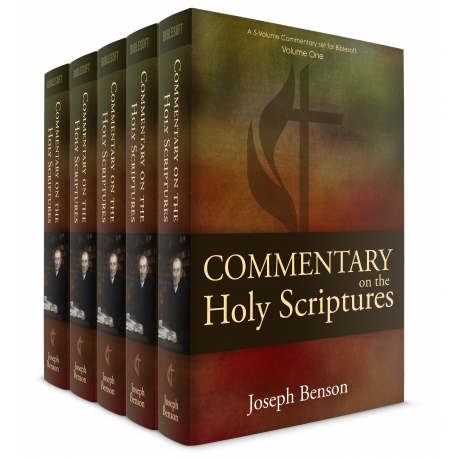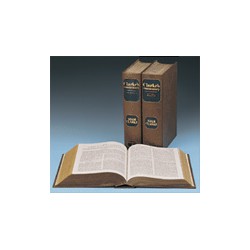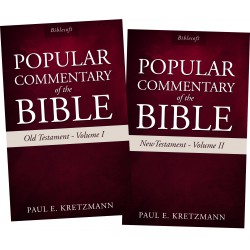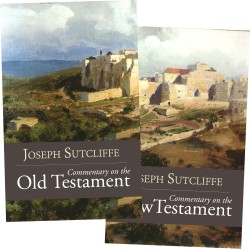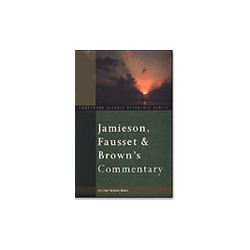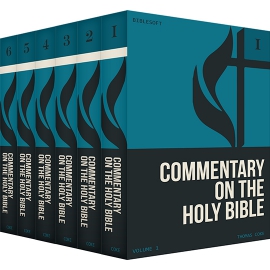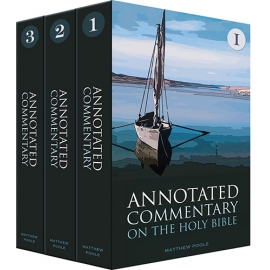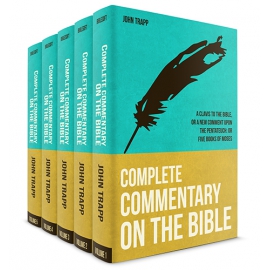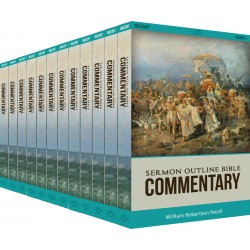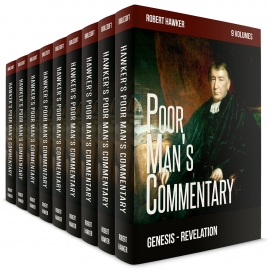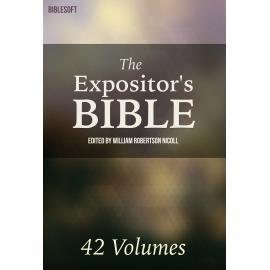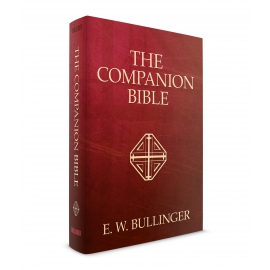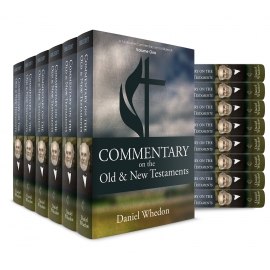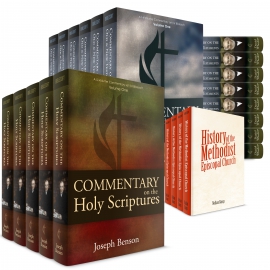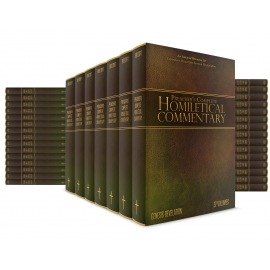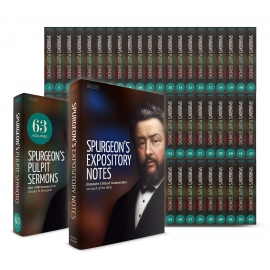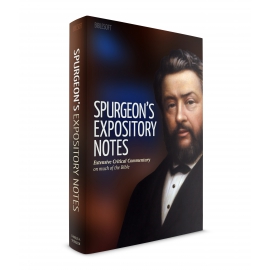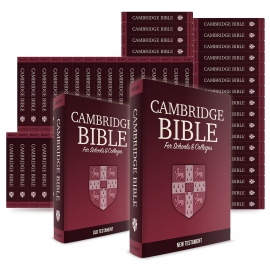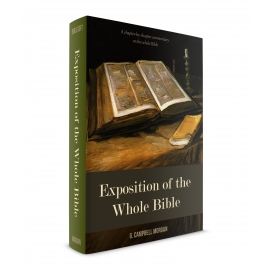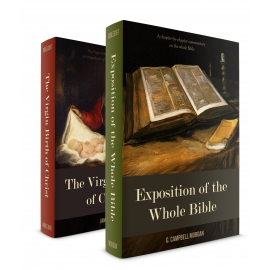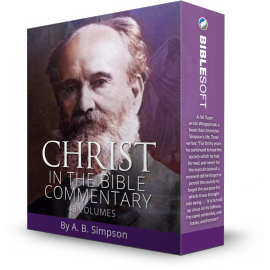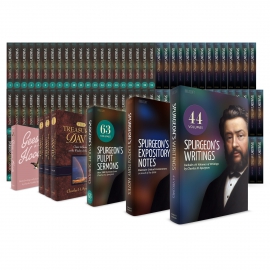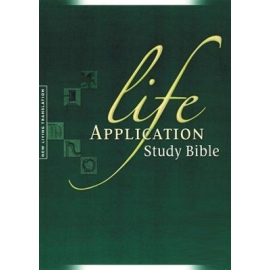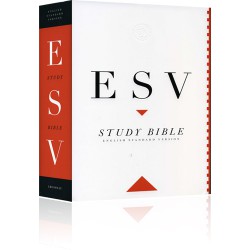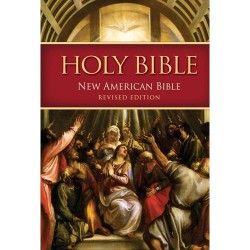No products
Product successfully added to your shopping cart
There are 0 items in your cart. There is 1 item in your cart.
Benson's Commentary on the Holy Scriptures (5 vols.)
Five volumes on the entire Bible by Dr. Joseph Benson a revered Methodist scholar.
BIBLESOFT DOES NOT SELL EBOOKS
Requires Program PCSB Version 5 or OneTouch (find out more)
- Write a review
Product Information
Joseph Benson’s five volume commentary on the entire Bible was written at the behest of the Methodist Conference.
Written by one of England’s most controversial Wesleyan and Methodist scholars, the commentary took over 10 years of the noted Dr. Benson’s life. He produced it well into his 70’s, writing every day between 5 AM and 11 PM, finishing it just a short time before his death. His conference had taken a vote and begged him to write it, and he did his best to comply.
He was also a contemporary of the well-known Dr. Adam Clarke, and this commentary is often placed beside Clarke’s commentary in a favorable light.
Praise for this Commentary
Clarke himself called Benson "…a sound scholar, a powerful and able preacher, and a profound theologian."
"In my opinion Joseph Benson's Commentary ranks right up there with Adam Clarke's and Thomas Coke's.
"It is amazing to realize that within a generation four massive commentaries on the whole Bible were published by British Methodists: Thomas Coke, six volumes; Adam Clarke, eight volumes; Joseph Benson, five volumes; Joseph Sutcliffe, two volumes."
Besides editing the Methodist Magazine for many years, he published A Defence of the Methodists, A Farther Defence of the Methodists, Vindication of the Methodists, Apology for the Methodists, Sermons on various Occasions, Life of John Fletcher, and A Commentary on the Holy Scriptures.
Demo
Screenshots
Excerpt
THE BOOK OF
PSALMS *
* Luke 20:42; Acts 1:20.
ARGUMENT
WE have now before us one of the choicest parts of the Old Testament, wherein there is so much of Christ and his gospel, as well as of God and his law, that it has been called the summary of both Testaments. The history of Israel, which we were long upon, instructed us in the knowledge of God. The book of Job gave us profitable disputations concerning God and his providence. But this book brings us into the sanctuary, draws us off from converse with men, with the philosophers or disputers of this world, and directs us into communion with God. In the original it is entitled, <ylht rps, sepher tehillim, that is, The Book of Hymns, or Praises; because, though it likewise contains prayers, complaints, histories, and descriptions, yet the principal part of it is taken up with the praises of God. The Greeks call them yalmoi, Psalms, which word signifies properly, compositions set, or sung, to music. St. Peter styles it, The Book of Psalms, Acts 1:20. It is a collection of Psalms, of all the Psalms that were divinely inspired, composed at different times, on several occasions, and here put together in one volume, without any dependance on each other. According to the Jewish tradition this was done by Ezra, after the return of the Jews from the captivity of Babylon, who also placed the volume among the canonical books. Thus they were preserved from being scattered and lost, and kept in readiness for the service of the church. One of these is expressly said to be The Prayer of Moses. That some of them were penned by Asaph, is intimated 2 Chron 29:36, where the people are said to praise the Lord in the words of David and Asaph, who is there called a seer or prophet. And some of them seem to have been penned long after, even during, or subsequent to, the time of the Babylonish captivity. But the far greater part were undoubtedly written by David, who was raised up for establishing the ordinance of singing Psalms and Hymns in the church of God, as Moses and Aaron were for settling the ordinance of sacrifice. Theirs is superseded, but this remains, and will remain, till it be swallowed up in the songs of eternity.
The Psalms are all written in a poetical style; though it is difficult, if not impossible, to tell of what particular kind the poetry of the Hebrews was. They abound, however, with sublime and figurative expressions, sufficient to denominate them truly poetical. As the style of them is forcible and elevated, so is it calculated most powerfully to touch the human mind, and to excite therein the most noble and elevated conceptions; on which account this book has always been held in the greatest veneration; insomuch that, in the earlier ages of the Christian Church, the bishops, priests, and all the religious, were expected to have it by heart. Melancthon says of it, that it is the most elegant work extant in the world: and St. Basil tells us, that in it may be found a complete body of divinity. “The Psalms,” says Dr. Horne, in his preface to his commentary on them, “are an epitome of the Bible, adapted to the purposes of devotion. They treat occasionally of the creation and formation of the world; the dispensations of Providence, and the economy of grace; the transactions of the patriarchs; the exodus of the children of Israel; their journey through the wilderness, and settlement in Canaan; their law, priesthood, and ritual; the exploits of their great men, wrought through faith; their sins and captivities; their repentances and restorations; the sufferings and victories of David; the peaceful and happy reign of Solomon; the advent of Messiah, with its effects and consequences; his incarnation, birth, life, passion, death, resurrection, ascension, kingdom, and priesthood; the effusion of the Spirit; the conversion of the nations; the rejection of the Jews; the establishment, increase, and perpetuity of the Christian Church; the end of the world; the general judgment; the condemnation of the wicked, and the final triumph of the righteous with their Lord and King. These are the subjects here presented to our meditations. We are instructed how to conceive of them aright, and to express the different affections which, when so conceived of, they must excite in our minds. They are, for this purpose, adorned with the figures, and set off with all the graces, of poetry; and poetry itself is designed yet further to be recommended by the charms of music, thus consecrated to the service of God; that so delight may prepare the way for improvement, and pleasure become the handmaid of wisdom, while every turbulent passion is calmed by sacred melody, and the evil spirit is still dispossessed by the harp of the son of Jesse.
This little volume, like the paradise of Eden, affords us in perfection, though in miniature, every thing that groweth elsewhere; every tree that is pleasant to the sight, and good for food; and, above all, what was there lost, but is here restored, the tree of life in the midst of the garden.” “What is there necessary for man to know,” says the pious and judicious Hooker, “which the Psalms are not able to teach? They are to beginners an easy and familiar introduction, a mighty augmentation to all virtue and knowledge in such as are entered before, a strong confirmation to the most perfect among others. Heroical magnanimity, exquisite justice, grave moderation, exact wisdom, repentance unfeigned, unwearied patience, the mysteries of God, the sufferings of Christ, the terrors of wrath, the comforts of grace, the works of Providence over this world, and the promised joys of that world which is to come; all good necessarily to be either known, or done, or had, this one celestial fountain yieldeth. Let there be any grief or disease incident to the soul of man, any wound or sickness named, for which there is not, in this treasure-house, a present comfortable remedy at all times ready to be found.” — Hooker, Ecclesiast. Pol., b. 5. sect. 37. In fine, such and so useful is the variety contained in this book, that, by an easy accommodation, it may be made to serve every one of our occasions. The Psalms are fitted to all persons and ages, to all manner of employments, and to all conditions and circumstances of life, whether of honour or dishonour, prosperity or adversity, health or sickness. Whether we be mourning for sin, thirsting after God, or rejoicing in his salvation; whether we be in heaviness through manifold temptations, or comforted by the experience of deliverance from them; whether we be earnestly seeking the divine favour, or grateful and happy that we have found that inestimable blessing, and have tasted that the Lord is gracious; whether we be fighting the good fight of faith, and wrestling with our spiritual enemies, or triumphing in victory obtained, and reaping the spoils of conquest; in short, whether we be repenting or believing, fearing or hoping, doubting or confiding, sorrowing or rejoicing, acting or suffering, admiring and praising God on earth, or expecting and longing to enjoy him in heaven, we may here find portions of divine truth descriptive of, and exactly adapted to, our state and condition. Here, in particular, we may learn what a steady confidence we ought to place in God under all our afflictions and troubles, and what transports of gratitude we ought to feel for his mercies and benefits conferred upon us; here we have examples of God’s dealings with his people, to direct us in our Christian experience and practice, and of his faithfulness toward those who trust in him, for our comfort and encouragement. Here we have devout and fervent prayers, and sweet and joyful songs of praise. So that, as Bishop Patrick observes, “to cure heaviness, to extirpate grief, to take away sorrow, to lay asleep troublesome thoughts and passions, to ease us of our cares, to recreate those who are oppressed with any sort of pains, to move compunction for sin, to stir up a true spirit of piety, and to inflame our hearts with love and gratitude to God, there is no book in the world to be compared with it.” Hence it is, as Dr. Horne further observes, that, “in the language of this divine book, the prayers and praises of the church have been offered up to the throne of grace from age to age. And it appears to have been the manual of the Son of God in the days of his flesh; who, at the conclusion of his Last Supper, is generally supposed, and that upon good grounds, to have sung a hymn taken from it;* who pronounced on the cross the beginning of the twenty-second Psalm, My God, my God, why hast thou forsaken me? And expired with a part of the thirty-first Psalm in his mouth, Into thy hands I commend my spirit. Thus he, who had not the Spirit by measure, in whom were hidden all the treasures of wisdom and knowledge, and who spake as never man spake, yet chose to conclude his life, to solace himself in his greatest agony, and at last to breathe out his soul in the psalmist’s form of words rather than his own.” No tongue of man or angel, as Dr. Hammond justly observes, can convey a higher idea of any book, and of their felicity who use it aright.
* St. Matthew informs us, Matt 26:30, that he and his apostles “sung a hymn;” and the hymn usually sung by the Jews, upon that occasion, was what they called “the Great Hallel,” consisting of the Psalms from the 113th to the 118th inclusive.
Only, then, let these Psalms be read and considered with fervent desires after, and a lively dependance on, the illuminating and sanctifying influences of the Spirit which first dictated, and can only enable us rightly to understand, mark, learn, and inwardly digest them, and we shall find them able to make us wise unto salvation, through faith in Him whose person and offices, whose love and sufferings, whose humiliation and exaltation, whose grace and glory, they so amply and excellently set forth. For to this portion of ancient holy writ, undoubtedly, so frequently quoted by the Lord Jesus in the days of his flesh, the apostle had a peculiar reference, when, in his second epistle to Timothy, he bore so decided a testimony to the divine inspiration, excellence, and usefulness of the Scriptures of the Old Testament. And of these Psalms especially may it be affirmed, that they are profitable for doctrine, for reproof, for correction, for instruction in righteousness, that the man of God may be made perfect, thoroughly furnished unto all good works.
CHAPTER 1
Ver. 1. Blessed is the man — The Hebrew words are very emphatical: Blessedness belongs to that man; or, O the blessedness of that man! Blessedness here means happiness. And the character of the truly happy man is described in this Psalm both negatively, in his abstaining from sin; and positively, in his practice of a most important duty, introductory to all other duties. It is then illustrated by a beautiful similitude, borrowed from vegetation; and, lastly, contrasted with the opposite character of the ungodly. In this verse we have the negative part of his character in three particulars: 1st, He walks not in the counsel of the ungodly. The word <yuvr, reshagnim, here rendered ungodly, according to Aben Ezra, signifies inquietos, qui nunquam in eadem constitutione permanent, the restless, who are never at one stay; according to Isa 57:20: “Those,” says Henry, “who are unsettled, aim at no certain end, and walk by no certain rule;” who may indeed be moral in their conduct toward their fellow-creatures, and outwardly unblameable, but live without a due regard to God and religion, which all unconverted persons do. Now the man that is truly pious, and therefore happy, doth not walk in the counsel of such; doth not lead his life according to their advice, or manner of living; doth not associate with them, give ear to their suggestions, or follow their example. This part of the happy man’s character is put first, because those that would keep the commandments of their God must say to evil-doers, Depart from us, Ps 119:115, and because wisdom begins in departing from evil. 2d, Nor standeth in the way of sinners — Of open and notorious sinners, to be picked up and gathered with them: but he avoids as much as may be the company of such, lest he should be insnared by them, and drawn by degrees into an imitation of their practices. He keeps at a distance from them, as he would from persons or places infected with the plague, for fear of the contagion. Or, standing in their way may imply a continuance in their manner of conversation. 3d, Nor sitteth in the seat of the scornful — Of those who make a mock of sin, and of God’s threatenings and judgments against sinners: who deride all wholesome reproofs and counsels, and scoff at goodness and good men. So that there seems to be a double climax, or gradation, in this verse, each following clause exceeding the former in two respects. For standing, or delaying, in an evil course, implies a greater degree of guilt than being occasionally entangled and induced to walk therein, and sitting denotes a more settled and resolved perseverance than standing. Again, the term sinners, in Scripture language, implies more wickedness than the word ungodly, and the scornful are the worst of sinners. Observe, reader, by what steps men arrive at the height of impiety. Nemo repente fit turpissimus: No one becomes very wicked all at once. They are ungodly first, casting off the fear of God, and living in the neglect of their duty to him. But they rest not there; when the services of religion are laid aside, they come to be sinners, that is, they break out into open rebellion against God, and engage in the service of sin and Satan: omissions of duty make way for the commission of crimes, and by these the heart is so hardened that at length they come to be scorners: they openly defy all that is sacred, scoff at religion, and make a jest of sin. Thus is the way of iniquity down hill; the bad grow worse, and sinners become tempters to others and advocates for Baal.
(from Joseph Benson's Commentary on the Holy Scriptures. Biblesoft Formatted Electronic Database Copyright © 2014 by Biblesoft, Inc. All rights reserved.)
Product Details

